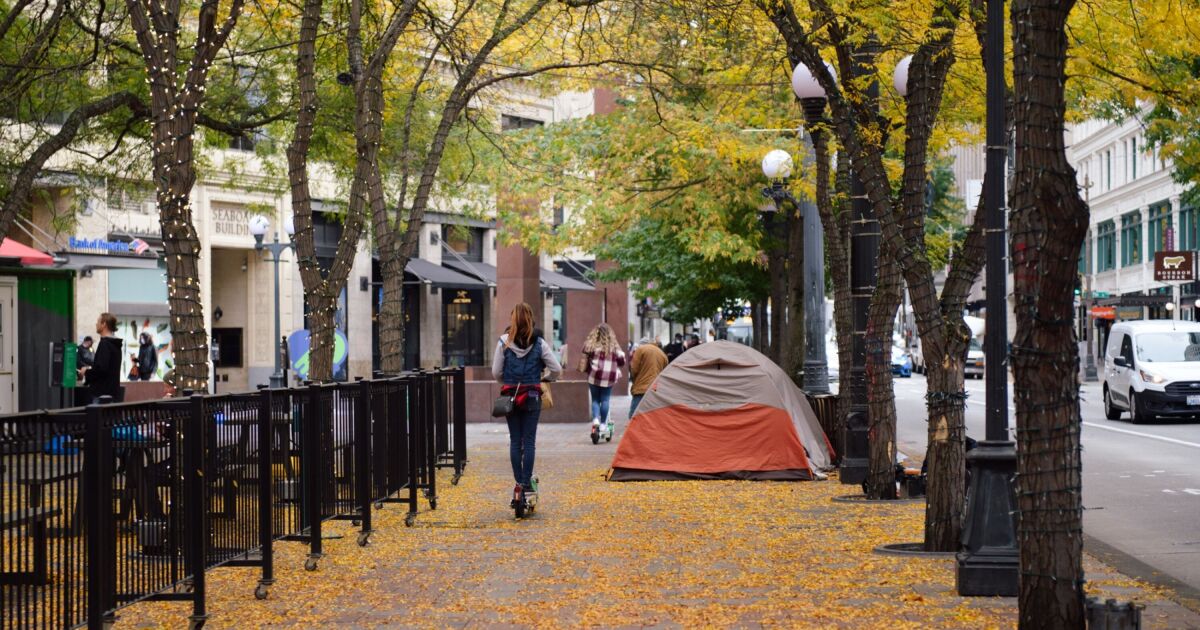
Seattle voters are poised to approve a ballot measure tripling the supplemental property tax that funds programs to support affordable housing in one of the U.S. most expensive markets.
The higher levy, which would expand upon an expiring one, could raise as much as $970 million over seven years to build affordable units and support low-income renters. Seattle is facing a housing crisis, with more then 13,000 people in the county experiencing homelessness amid a shortage of nearly 30,000 affordable units.
The city's mix of geographic constraints, tech-fueled population growth and history of restrictive zoning has fueled the housing crunch. The levy, which has been in place for more than 35 years and was last reauthorized in 2016, supports the construction and maintenance of subsidized units for sale and rent, as well as programs for people experiencing long-term homelessness.
Voters are likely to approve the measure when they go to the polls Tuesday. It has the support of nearly 100 local and national organizations, including labor unions, the city's chamber of commerce and Amazon.com Inc., the city's largest employer.
Seattle voters "understand the intersection between affordability, quality of life, robust and accessible transit options and the vibrancy and economic impact that that brings to the city and the region," said Kylie Rolf of the Downtown Seattle Association, a coalition of businesses and other groups that supports the ballot initiative.
Under the measure, the owner of a home assessed at $800,000 — the median price in Seattle — would pay roughly $360 a year, up from $108 currently.
Other U.S. cities are experimenting with new levies of their own, often focused on pricier properties. Chicago's City Council committee recently voted to advance a ballot measure that would tax real estate sales of more than $1 million. Los Angeles voters last year approved an additional transfer tax on deals of more $5 million.
In Seattle, the main public voice of opposition has been Roger Valdez, who describes himself as a developer and said a city election official asked him to write the statement against the measure for the voter information guide.
Valdez said the units funded by the levy represent "a tiny little trickle of housing compared to what the demand is," which he said needs to be coupled with deregulation to allow for greater density to increase the housing stock.
'Layering Sources'
The funds raised by the additional tax were never intended to be a single solution, according to Denise Rodriguez, a member of levy's oversight committee, which has been issuing annual reports on the initiative for more than a decade. She said new state laws and city initiatives will ease restrictive zoning, noting that funds from Seattle's housing levy multiply other programs and the city's housing vouchers.
"Developers are layering sources together," said Rodriguez, who is also the executive director of the Washington Homeownership Resource Center, a nonprofit. "If any one piece went away, the whole thing could fall apart.
The Oversight Committee's 2022 report details how these programs complement each other. One project to construct apartments for families and individuals earning less than 60% of the area's median income received $2 million from the housing levy, bolstering $12 million from other sources, for example. Private equity investment encouraged by the federal Low Income Housing Tax Credit is the largest source of external funds, according to the report.
One of the proponents of the measure is Habitat for Humanity, which plans to apply for housing-levy funds to help construct over 200 units in Seattle over the next five years. Ryan Donahue, Habitat's chief advocacy officer for the region, said the rate needs to be increased in part because of higher construction expenses compared with when it was last authorized.
"If we want to provide more services," he said, "that's going to require even more investment."



